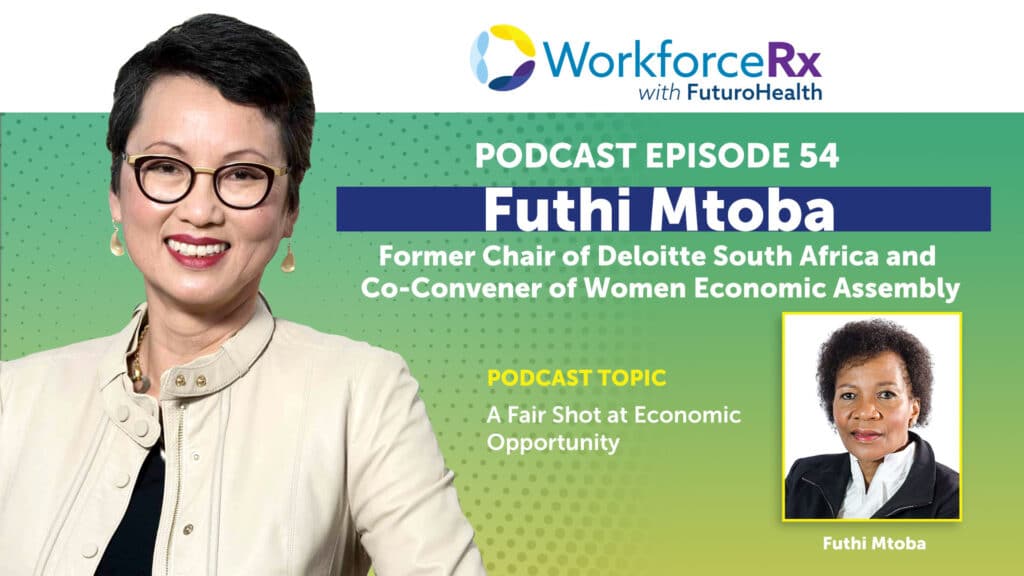
Futhi Mtoba, Former Chair of Deloitte South Africa and Co-Convener of Women Economic Assembly: A Fair Shot at Economic Opportunity

PODCAST OVERVIEW
Transcript
Van Ton-Quinlivan: Welcome to WorkforceRx with Futuro Health, where future-focused leaders in education, workforce development and healthcare explore new innovations and approaches. I’m your host Van Ton-Quinlivan, CEO of Futuro Health.
Improving diversity, equity and inclusion in the workplace has been a frequent topic on this podcast. Well, today we’re going to broaden our view and think more globally. Let’s learn how South Africa is taking a systems approach to tackling one piece of the DEI agenda, which is improving economic opportunity for women.
Our guide is Futhi Mtoba, Co-Convener of the Women Economic Assembly, a national initiative seeking improved access for women to government and private sector procurement, employment, housing and other economic essentials. In her extensive business career, Futhi was the first Black woman to be named a partner, and later board chair, at Deloitte Southern Africa. Deloitte is a global accounting and professional services firm.
She also serves as an advisor or board member for the International Monetary Fund and the United Nations Global Compact. She is also a 2017 Harvard Advanced Leadership Initiative Fellow; co-founder of TEACH South Africa; and trustee of the Nelson Mandela Foundation, just to name a few of her contributions. Futhi and I became connected through the International Women’s Forum, a global community of dynamic women leaders. Thanks for joining us today, Futhi.
Futhi Mtoba: I thank you, Van, for having me.
Van: I’m so delighted to host you here in California while you’re visiting the U.S. You are an extraordinary woman of achievement, and so down to earth. You shared with me that you came from a family of ten children where all the girls have grown up to be powerhouses just like you. For all of us listeners who are in the thick of parenting, to whom or what do you give that credit?
Futhi: Thank you again for the invitation to this podcast, Van, and greetings to everyone who could be listening. And thank you for the heartfelt introduction. To answer your question, I definitely give credit and gratitude to my parents. When I reflect with my siblings, we realize that our parents were feminists long before I even knew the term feminist. My dad told us that society will expect us to do more than men for us to be recognized. I was raised in a family of three sons and seven daughters. It was therefore a blessing that destiny had bestowed my father with more girl children. His daughters were the apple of his eyes. From the beginning, he used to verbalize that he was not worried about his sons. His daughters were more important for him because girls needed to be financially independent and this could only be achieved through education.
He recognized that society marginalized girls and women, therefore more effort needed to be dedicated towards women’s success. His conversations were very forthright regarding these issues. He would say, “I don’t want you to stay in a relationship with a man until he kills you because you have no financial means to look after yourself.” He would say this with such a passion that even today it still resonates with us.
So, as you know, education for girls is not always seen as fashionable and remains a privilege to the community. For our parents to relentlessly place education above all else during those years was groundbreaking. Probably it is the reason why I remain involved in education and the empowerment of women beyond my retirement.
Van: Well, your father was a good man — and your mother, too — in terms of being so supportive of you and your sisters. So, Futhi, paint for us a general picture of the economic status of women in South Africa.
Futhi: Women currently make up 51% of South Africa’s population and about 42% of households are headed by females. Yet, almost 50% of women and girls aged between fifteen and sixty-four are economically inactive in South Africa according to the International Labor Organization’s report as recently as 2022. This drives home the fact that half of the working-age women are not part of the labor force compared to their male counterparts.
Black women specifically are employed in low skilled, low paid jobs, and the poverty levels therefore amongst black women are very high. So, the productive potential of South African women in the labor force remains very unused. If you looked at the markets, only seven of the top 100 Johannesburg Stock Exchange-listed companies are led by women, indicating that even though there is so much that has been done since the democracy of South Africa, there has been minimum progress in that region as for the representation of women in senior management and executive positions.
This was also confirmed by a recent study in 2022 by PWC where they also emphasized that in addition to the lack of visibility of these women in this role, there’s also a gender pay parity problem that is very high in both small and large companies, and the race gap as well is significantly pronounced. So, you can see that this data demonstrates that we need to be more forthright and also that urgent action is needed for us to support women, both in the workplace and those women that also are seeking to enter the market.
Van: Well, certainly in the United States we have analogous situations. I’m curious, what are some of the policy or program changes sought out by the Women Economic Assembly to address the inequities? And what was the role of government in catalyzing that work?
Futhi: So, the equity and inclusion of women-owned businesses in the public procurement sector report indicates that only between 1% and 6% of state contracts currently go to women-owned businesses. In addition, in South Africa we have the highest rate of gender-based violence, according to the state South Africa Report of 2018. Our femicide rates are five times higher than the global average. That led to the National Strategic Plan on Gender-Based Violence, which in one of its pillars identifies that economic power to women is critical, and it takes the perspective that economic vulnerability of any kind leads to further vulnerabilities.
What that meant is that to transform our economy, we needed to ensure that women progressively have greater ownership of economic power, which not only takes consideration the much-needed employment, but also women owning productive assets, businesses,
and having access to economic opportunities. Therefore, the economic pillar of the National Strategic Plan enabled the public and private sector to work out what are the practical actions that are needed to give effect to this policy framework, and that led to the establishment
of the Women Economic Assembly, which was an idea of creating opportunities for women in business to participate in industry via the value chain.
South Africa had identified seventeen sectors through the Department of Trade, Industry and Competition that are priority sectors. The department had done exceptional work and continues in transforming the economy from a localization perspective by having more black participants. But as we applauded this increase in black participation, when we looked at the statistics we realized that there was minimum participation of women and there was lack of statistics about to what extent women are supported.
So, we started with the gender participation framework that highlighted the areas of women- owned business participation in the value chain, employment, pay parity, and also employment parity and representation at the executive level.
Van: You mentioned these seventeen industry sectors. How was the private sector brought to the table as part of the solution and what was their role?
Futhi: So the seventeen sectors have already signed what we call master plans with the department, which means there’s an agreement between the labor, government and business on how to localize the economy. However, it became very easy for us to use that as an entry, because we said in this strategy of localization, can we also see what the level of participation
of women is going to be? And then of course, we realized that there were no statistics that indicated what was the plan. Therefore, we then asked the companies to state in their plan of localization the plan to include women and what are those targets that you’re looking for and what would the level of participation be? That then enabled us to also ask that we need to have an ecosystem that looks at how will this participation be enabled.
If you look at the automobile sector, for an example, it’s quite a technical area where in order to own any of the garages you need to also have the level of sophistication and education. You can’t be a dealer if you haven’t gone through that dealership training. So we then say, “Okay, tell us how you are preparing the women.” That is why the ecosystem becomes very critical.
Van: I see. So, let’s switch a little bit. Futhi, you’ve touched so many endeavors in your career. You also sit on the board of the all-girls school that Oprah Winfrey set up in South Africa. Do you have any added advice to our listeners on how we should think about economic and workforce inclusivity and mobility?
Futhi: Yes. In my experience over the years, I’ve realized that education really underpins everything. Because if you look at the South African rate of unemployment and you look at what the country needs in order to develop, we need a lot of STEM education. We need to continue educating girls, but over and above that, we then need to create the opportunities, hence the understanding of the pipeline of the plans in the country around areas of STEM
or technology that we want to be engaged in.
One of the important parts around education is that in our country, we have a very low level of math test pass rates, and therefore the STEM education becomes quite critical. And then also in terms of just women and girls looking at their dreams and knowing how they can fulfill their ambitions, the leadership training of girls as young as in high school becomes very crucial. Hence, the schools like the Oprah School are a very critical initiative from a South African perspective.
Van: Education, access to education opportunities and then leadership training…these are all good lessons. Why don’t we wrap up now with a final question? Let’s end with you sharing your observations on the future of work and workers. What more should we consider?
Futhi: That’s a very interesting question, Van, because if you consider the changes
that have been brought about by COVID, it really left the world and industries; it left schooling; it left whatever area you look at in terms of job creation and job opportunities…it made us all rethink how we do it. How we educate, how people are employed, should they be visibly at work? Should they be at school? And also the importance of technology in this whole area.
So, I believe that encouraging more STEM education, particularly in our areas, will continue to be significant such that the young people can become whoever they want to be and achieve their dreams.
Van: Well, Futhi, thank you very much for sharing your wisdom with us to encourage us to rethink everything we do, rethink how we pair with technology, and of course the investment in STEM. It was great to have you today.
Futhi: Thank you very much.
Van: I’m Van-Ton Quinlivan with Futuro Health. Thanks for checking out this episode of WorkforceRx. I hope you will join us again as we continue to explore how to create a future-focused workforce in America.
